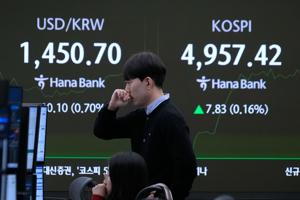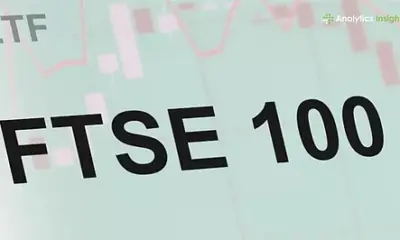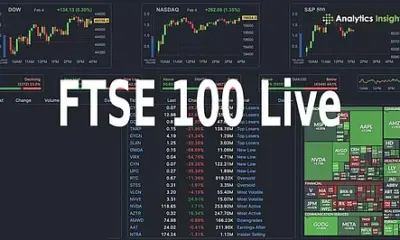Technology
FTSE 100 Drops Over 1% as Banks and Property Stocks Weigh Heavily

The FTSE 100 opened lower on Thursday, witnessing a decline of 101.3 points or 1.03% to 9,706.65. This drop reflects a growing sense of caution among investors, particularly as selling pressure mounted across banks, housebuilders, and property stocks. Concerns around shifting tax expectations and a broader weakness in global markets contributed to this downturn.
Banking and Construction Stocks Lead the Decline
Major UK banks faced significant losses, with both Lloyds and NatWest falling nearly 3%. Investors expressed unease over potential changes to income tax policy and its potential impact on monetary policy. Housebuilders were similarly affected; Persimmon experienced a notable decline of 3.96% to £1,223.50, while Berkeley Group dropped 3.68% to £3,818.
Despite raising its full-year outlook based on stronger rental income trends, Land Securities still saw a decline of nearly 4%. This demonstrates how a pessimistic market backdrop can overshadow even positive operational improvements.
Mixed Performance Among Corporate Stocks
While the broader market faced pressure, some stocks managed to gain traction. Burberry rose by 1.38% to £1,245, bolstered by renewed interest in retail exports. Diageo increased by 0.25% to £1,822.50, while Shell and DCC also experienced modest gains of 0.16% and 0.12%, respectively.
Conversely, retail-linked stocks like NEXT fell by 1.72% to £14,025. Other notable declines included Endeavour Mining, which slipped 3.18% to £3,294, and Antofagasta, retreating 2.86% to £2,715 amid softer demand trends in industrial metals.
The context for these declines was further compounded by a selloff in the US markets the previous evening, with the Dow Jones and S&P 500 each falling 1.7% and the Nasdaq sliding 2.3%. These movements were triggered by hawkish commentary from Federal Reserve officials, raising concerns that the recent AI-driven rally might be overextended.
In Asia, similar trends were evident as Japan’s Nikkei 225 dropped 1.8% and Hong Kong’s Hang Seng fell 1.6%, highlighting a climate of global risk aversion.
The situation was further complicated by reports suggesting that UK Chancellor Rachel Reeves might reconsider proposed income tax rises in favor of adjustments to tax thresholds. This news unsettled bond markets, pushing the UK 10-year gilt yield up to 4.54%. The shift in fiscal direction raises questions about upcoming decisions from the Bank of England, particularly if tax policies are altered in ways that could dampen economic activity.
As the markets navigate these challenges, investors remain vigilant, weighing the implications of both domestic policy changes and international market movements.
-

 Science1 month ago
Science1 month agoNostradamus’ 2026 Predictions: Star Death and Dark Events Loom
-

 Technology2 months ago
Technology2 months agoOpenAI to Implement Age Verification for ChatGPT by December 2025
-

 Technology7 months ago
Technology7 months agoDiscover the Top 10 Calorie Counting Apps of 2025
-

 Health5 months ago
Health5 months agoBella Hadid Shares Health Update After Treatment for Lyme Disease
-

 Health5 months ago
Health5 months agoAnalysts Project Stronger Growth for Apple’s iPhone 17 Lineup
-

 Technology5 months ago
Technology5 months agoElectric Moto Influencer Surronster Arrested in Tijuana
-

 Science2 months ago
Science2 months agoBreakthroughs and Challenges Await Science in 2026
-

 Education5 months ago
Education5 months agoHarvard Secures Court Victory Over Federal Funding Cuts
-

 Health5 months ago
Health5 months agoErin Bates Shares Recovery Update Following Sepsis Complications
-

 Science4 months ago
Science4 months agoStarship V3 Set for 2026 Launch After Successful Final Test of Version 2
-

 Technology7 months ago
Technology7 months agoMeta Initiates $60B AI Data Center Expansion, Starting in Ohio
-

 Technology6 months ago
Technology6 months agoDiscover How to Reverse Image Search Using ChatGPT Effortlessly





















